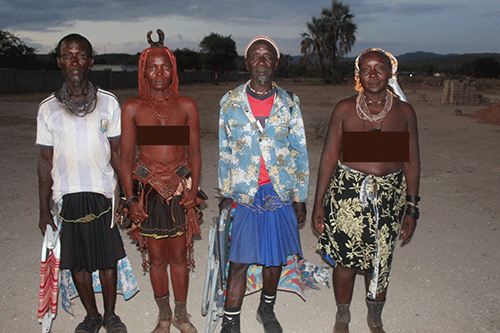Okanguati - The inaccessibility of the Orokave village in the Epupa constituency of the Kunene region is forcing the residents to bury their dead in an undignified way, which they were warned is illegal.
The mountainous area is cut off from essential services, with locals using donkeys for movement while government and the Electoral Commission of Namibia have in the past used helicopters to reach the area.
Residents are using donkeys to transport their relatives to the clinic which is 40 kilometres away but in most cases, they do not reach the hospital as they die on the back of donkeys while on the way.
Orokave is situated 40 kilometres outside Epupa and is dominated by Ovatjimba people who are also classified by the government as previously disadvantaged and marginalised.
The headman of the area Kataazu Vaamburura told government representatives who visited the constituency last week that his people need access roads as they feel left out.
“When I buried my mother, we just dug a hole and put her in without a coffin. She was wrapped in a blanket. Just the way we use to do it during the colonial era. These are things we do not want to subject our children to,” he explained.
“We all know that my area is inaccessible. No services are brought to us because we are in a mountainous area with no road. The only service we have received so far was brought with a helicopter and that was an election. We are in pain and our society is traumatised by the situation. It is like we are living in a different country. No clinic, police, hospital, water or other fundamental services that any person would wish to access,” he emotionally explained when he took the floor.
“We are tired. My people are dying, we need access roads. We need services and development just like other Namibians. I lost my mother and I buried her the same day she died. We couldn’t save her because the donkey could not reach the hospital on time. We are traumatised by what we see every day,” he continued.
Sympathising with the headman was Katuhindi Muhenje, who narrated her ordeal of losing her son while transported on a donkey to the hospital in Epupa.
“He was transported by the older cousin last October. He died on the way to the hospital. We have to go to the spot where he died and bury him immediately because we cannot bring the dead home. It is so painful because we mourn with heavy hearts. It is emotionally draining and we need to bury our people in a normal way just like other people,” she explained.
The Inquest Act of 1993 stipulates that any person who has reason to believe that a person has died an unnatural death, shall as soon as possible report accordingly to a member of the police, unless such a person has reason to believe that a report in that regard has been or will be made by any other person.
“Any person who without good cause fails to comply with the provisions of the Act shall be guilty of an offence and liable on conviction to a fine not exceeding N$l 000 or to imprisonment for a period not exceeding three months or to both such fine and such imprisonment,” states the law.
She also added that crimes are not reported as the police cannot reach the area.
“Anyone who wants to reach us can either use a donkey or helicopter. The last time we have seen officials in our area was during the election in 2019. They came with a helicopter. But if they want to bring us drought-relief food they use to drop it at Epupa where there is an access road and then we go transport it with our donkeys,” she said.
Another villager who accompanied the chief to the community meeting at Okanguati was Katohe Muhonje who emphasised that Ovatjimba women in the area give birth in the bushes.
“For the expectant mothers, we hardly take chances to take them to the hospitals. They deliver at home and go to the clinic when the babies can be transported on the donkey. Our situation is frustrating. We need the road so that our living conditions will improve,” she said.
Officials who attended the meeting, organised by governor Marius Sheya, said the planned tar road in the area must reach Orokave.
The residents reminded the government through the
councillor, who was present, that they have been deprived of development by the lack of access roads.
Chief of Otjiurunga Traditional Authority Mateus Ruhozu also sympathised with the Orokave residents, saying the government should speed up the process of upgrading the Opuwo-Epupa road so that it will reach Orokave as the people have been suffering for too long. “These people have been suffering for a very long time. The road must be prioritised so that people will have an access road. It is not fair some areas have access roads in the region while others have nothing,” he said.
The region is planning to
upgrade the Opuwo-Okanguati-Epupa road as it has repeatedly experienced flash floods that not only damaged the it but cut off the community from essential services when it rains. –ljason@nepc.com.na


